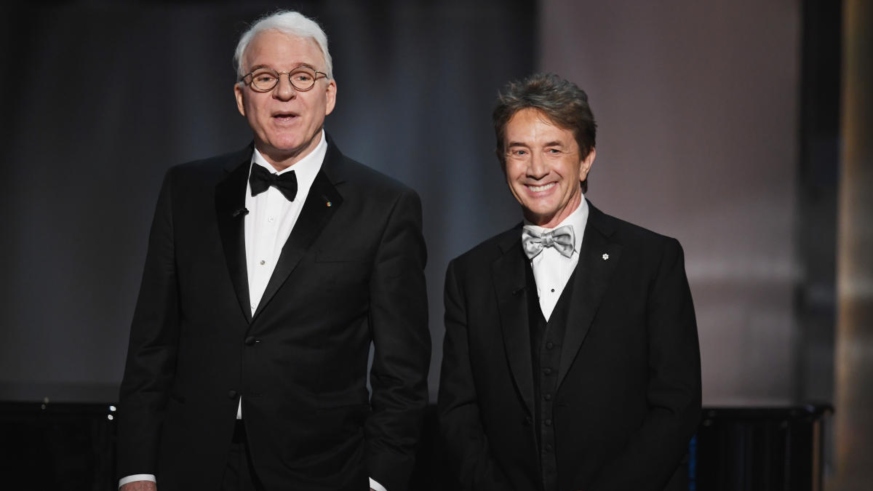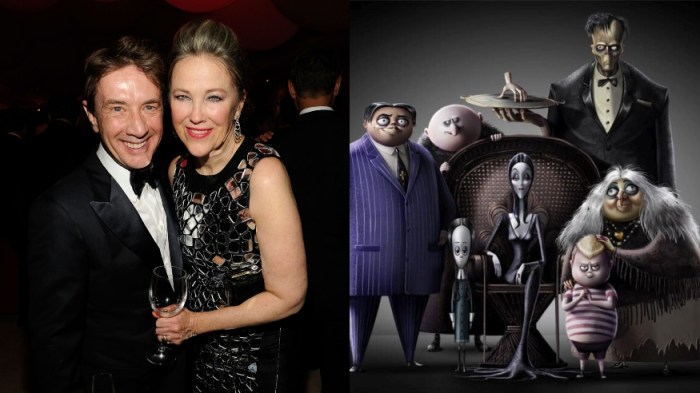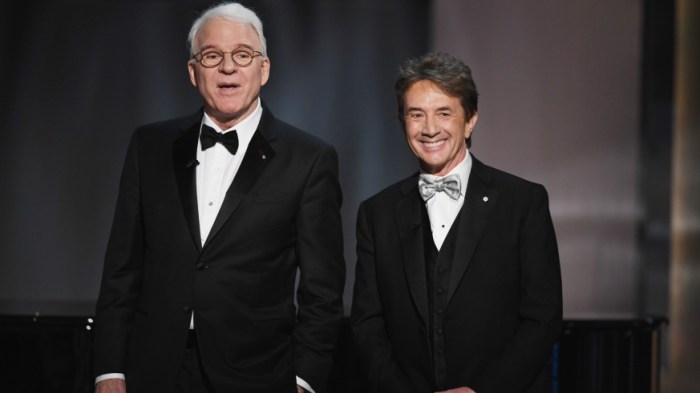If black belts were awarded in comedy, Steve Martin and Martin Short would be considered grandmasters of the medium. Both men have been making fans laugh for decades, and neither star plans to slow down anytime soon. In fact, the legendary duo is hitting the road again with their latest stage tour, “Now You See Them, Soon You Won’t,” which stops at Foxwoods’ Grand Theater on Saturday night. We caught up with the comedy icons ahead of their trip to New England this weekend.
Why team up for a stage tour as opposed to doing a film or another medium? What is it about comedy onstage that still speaks to both of you?
Martin Short: The schedule of it is very controllable. A movie can be months in a foreign city. This is something we do three or four times a month. The reason we keep doing it is because we have so much fun doing it.
Steve Martin: When I ended my stand-up career, I had been doing it for 18 years. All of those shows go up in the air. They disappear. If you ever said a line perfectly or really pleased the audience or went over well — it’s just gone. So I thought, “What a great idea to do movies.” You can do several takes, you can do five or six takes and get it exactly right and it’s there forever. And I did that. Now, I really like going back to trying to get it right every night. Even though it goes up in the air, we gave the audience a very good show.
How do you define “getting it right”?
Martin: It’s intuitive. I don’t know. It’s just a feeling of perfection. You’re in response with the audience always, you’re in kind of a dialogue with them, really. Learning how to extend the line or not say the next line right away or do say the next line right away or throw away a line or lay on it — there’s just so many little aspects to it.
Short: People can do a run for a year on Broadway of the same play and still feel excited after months, because they feel that night they actually nailed it, actually did it perfectly.
Martin: Right. And then once you’ve done it, you think, “I’ve finally got it.” And you go out the next night and do the same thing and it’s missing something.
It seems like there are so many more ways for comics to express themselves today. Comedians also seem to be under more scrutiny for their material. What are your thoughts on comedy today?
Martin: I think that the comedians are great. We laugh, Marty and I, we discuss. In fact, even in our show, we pay tribute to older comedians and newer comedians. But I think it’s actually kind of harder to have so many outlets, to make those decisions about what to do and you have to cover them all. We were doing publicity once and I said, “What’s the best way to do publicity today, say, for a record?” And they say you have to do everything, meaning it has to be digital, it has to be online, it has to be on TV, you have to go to book signings.
Short: I think what’s tricky, obviously, is the PC element of it. Sometimes people say things to get a laugh and it doesn’t represent what they feel. They’re almost satirizing a jerk’s take on a subject. And they might’ve said it eight years ago, and now they have to pay the price. I think that would be very tricky, to always be paranoid about what keeps dead. But I think both Steve and I don’t particularly go in the world of shock humor, so that hasn’t been a concern.
It’s easy to be a flash in the pan, but long-term, sustained success in entertainment is quite the feat. What do you think are the keys to long-term success in this industry?
Martin: You said it’s easy to become a flash in the pan, but that’s hard too. I was a flash in the pan, and I had to think my way out of it. The way I got out of it was having the opportunity to go into film and then working on that. That really maintained my career for a long time, and then I started writing more and that maintained my career. Then I came up with this music thing, that maintained my career for 10 more years. And now, I’ve got my buddy Marty who’s going to maintain my career.
Short: I’m going to maintain you forever [laughs]. But I don’t know. As a Canadian, we were conditioned as a young actor to always play three mediums at once. There was no star system so you didn’t say, “I’m a movie star.” That didn’t exist. What that’s always allowed me to do is it, if no one’s interested in the movies, then I go to Broadway, then to television and moving around. You just kind of feel where you’re wanted and what you can accomplish creatively.
























